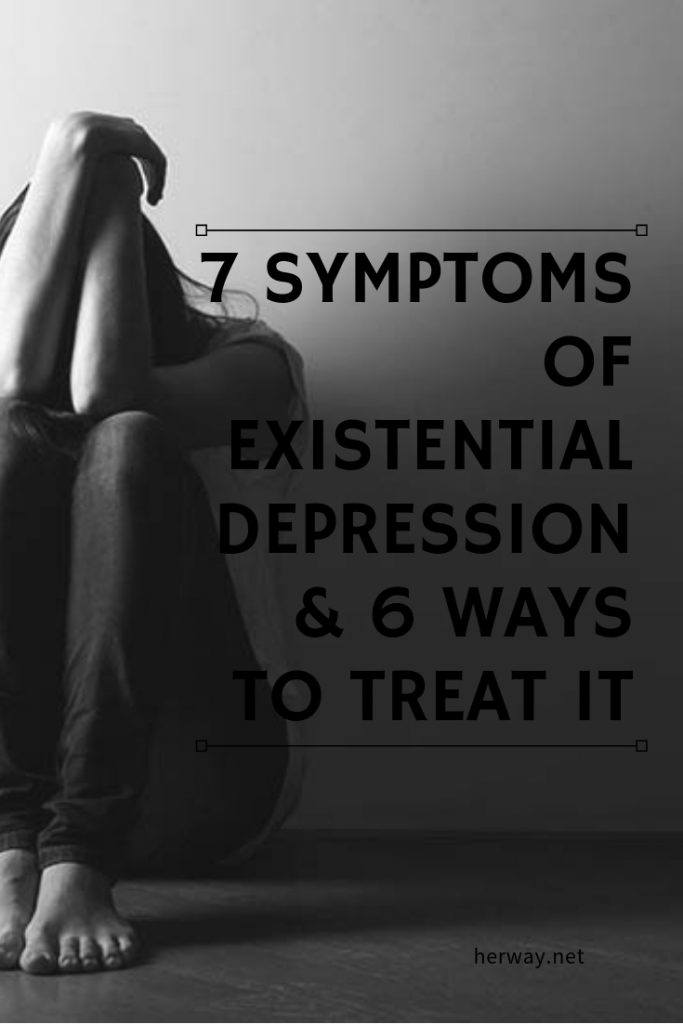7 sintomi di depressione esistenziale e 6 modi per trattarla
Che cos'è la depressione esistenziale?
Esistono molte forme di depressione e la depressione esistenziale è solo una di queste.
Tuttavia, questo tipo di depressione è piuttosto speciale in più di un modo.
Innanzitutto, la depressione esistenziale è difficile da diagnosticare.
Also, this type of depression can occur at all ages and doesn’t have to be strictly connected with a certain event in someone’s life.
It can be a consequence of some big change, part of a midlife crisis, or part of a person’s identity search.

L'aspetto interessante della depressione esistenziale è che di solito colpisce individui dotati che stanno cercando di andare a fondo della loro esistenza.
È uno stato caratteristico delle persone dotate che si preoccupano eccessivamente di questioni di vita, morte, libertà, isolamento e significato.
Anche se l'esperienza della depressione esistenziale non è affatto gioiosa per chi la combatte, ci sono anche alcuni esperti che la considerano una forma di catarsi e una parte della disintegrazione positiva.
Some see it as a gift and chance for personal growth, a test of one’s spiritual and mental power and strength aka risveglio spirituale.
In ogni caso, il punto fondamentale è che la depressione esistenziale è qualcosa che va preso sul serio.
Nevertheless, despite being difficult to handle, it doesn’t mean that it can’t be successfully treated.
Tuttavia, prima di aspettarsi di imparare a gestire con successo la depressione esistenziale, bisogna innanzitutto saperla riconoscere.
Ecco 7 segnali che vi aiuteranno a farlo.
7 segni di depressione esistenziale
1. You’ve isolated yourself from society
One of the first signs that you’re experiencing existential depression is voluntary isolation from the world.
Trascorrete la maggior parte delle vostre giornate in completa solitudine e avete la sensazione che nessuno vi capisca davvero.
Even though we all need some time to relax by ourselves, with you, it’s different; being on your own has become a habit of yours.
It’s not just that you can’t stand being in crowded places or that you’ve become un introverso who doesn’t want to meet new people, you literally can’t stand anyone’s presence around you.
All of a sudden, without any specific reason, you’ve cut ties with your closest friends and family members, even though they did you no harm.
You’ve started living your life as a loner because being near someone else provokes unrest and unease you can’t explain to anyone, including yourself.
2. You’re anxious and pessimistic about the world’s future

I sintomi più comuni della depressione esistenziale sono la crisi esistenziale e l'ansia che di solito la segue.
Quando si soffre di depressione esistenziale, la visione del mondo è sempre negativa e pessimistica e non si vede mai la luce alla fine del tunnel.
You’re overly concerned with the future of the world in general and the psychological state of the entire human race.
Anche se questi sono tutti problemi reali che tutti dovremmo avere in mente, la differenza tra voi e il resto delle persone è che questi pensieri vi hanno impedito di condurre la vostra vita quotidiana perché la vedete come destinata al fallimento.
Non solo, vedete l'intera razza umana come senza speranza e indifesa.
In your mind, there doesn’t exist a better tomorrow or the possibility of things ever improving.
3. You’re interested in the meaning of life and death
Another sign of existential depression and existential crisis is the fact that you’re also overly concerned with the deeper meaning of things, especially of life and death.
Perché siamo stati mandati su questo pianeta? Qual è il nostro scopo in questo mondo?
What is the point of living if we’re all about to die anyway?
What is the point of trying to make our lives better when we’re all destined to vanish one way or another?
Esiste una vita dopo la morte? La nostra anima trascende in un'altra dimensione o semplicemente scompariamo come se non fossimo mai esistiti?
Perché è stato creato l'universo? Qual è lo scopo della razza umana su questo pianeta?
Sono le domande esistenziali che vi tengono svegli la notte e le cose che vi impediscono di funzionare correttamente.
Pensate che la vostra esistenza sia completamente priva di significato e non vedete alcun senso nell'aiutare voi stessi e nel cercare di allontanarvi da questa situazione. depression you’re facing.
4. Dormite troppo

Nessuno di questi pensieri oscuri e negativi vi lascia in pace nemmeno per un minuto.
No matter what you do and how hard you try to reprogram your brain to think about something else, you simply can’t get rid of them.
That is exactly why you seek comfort in sleep because this is the only period of the day when you don’t feel like you’re haunted by your mind that you can’t seem to control.
We all need enough time to rest both brain and body, and taking a nap from time to time isn’t something that should concern anyone.
Tuttavia, se dormire è il momento clou della vostra giornata e se passate tutto il tempo ad aspettare con ansia di andare a dormire, essendo l'unica cosa che vi rende calmi e tranquilli, allora avete un problema.
5. Niente ha più senso
When you’re dealing with existential depression, everything in your life has lost sense.
You don’t enjoy the little things anymore and literally nothing and nobody can make you happy.
You don’t look forward to weekends, holidays, watching your favorite TV show, or spending time with your loved ones.
You see no way out of your current state and it’s like you’re just living because you have to.
Con il tempo, ci si trasforma in un emotivamente non disponibile robot – you don’t get excited, happy, or aroused, and nothing brings you joy anymore.
Everything has become a flatt line and you feel like you’ve become completely numb.
It’s not only that you don’t feel positive emotions anymore, you’ve lost the ability to be moved or touched by anything sad as well.
It’s like you’ve become completely indifferent towards anything going on in your life and as if you’ve lost all empathy toward other living creatures.
6. Non avete alcuna motivazione

Le persone affette da depressione esistenziale non hanno alcuna motivazione.
With time, simple everyday tasks, such as getting out of bed, going to work, or engaging in social activities become too much to handle and an enormous burden on the chest. And you’re no exception.
All of a sudden, you’ve stopped pursuing your life goals and chasing your dreams.
Everyone around you assumes that you’ve just become lazy and lethargic, but with you, it’s more than just that.
No matter how hard you try, you can’t get yourself to function properly, let alone make some bigger changes in your life.
It’s like you’re stuck in one place and you can’t muster the strength needed to move from the dead spot.
The worst part is that you’re actually aware of your state, but you can’t force yourself to make a difference, as much as you’d like to.
7. Avete pensieri suicidi
Even though this is something you don’t tend to talk about, it is nothing unusual for a person with existential depression to essere suicida.
Lately, you’ve been spending your days waiting to die and you’ve convinced yourself that nobody would miss you and that the world wouldn’t feel your absence.
Innanzitutto, pensare in questo modo non è qualcosa di cui ci si debba vergognare.
Nevertheless, if these thoughts are something you’ve experienced during your struggles with existential depression, it means it’s finally time to start working on your mental health.
It is a clear red flag that you should try and find ways to fight it and here is exactly how you’ll do it.
I won’t lie to you – there is no magic medicine that will help you get out of this overnight.
Quello che dovete capire è che la depressione esistenziale non è una malattia, quindi non c'è bisogno di curarla.
Tuttavia, può essere trattata e affrontata con successo. Ecco 6 modi a prova di bomba per farlo.
6 modi efficaci per gestire la depressione esistenziale
1. Remember that you’re not alone

First and foremost, you need to be aware that there are many gifted children and gifted adults all around the globe who go through everything you’re going through right now.
You’re not alone in this world, even though it appears that way right now.
2. Trovate ciò che vi appaga
Some of the biggest problems with existential depression is the void everyone suffering from it feels, and the fact that you’ve convinced yourself that you’ve lost purpose in this life.
This is exactly why it’s crucial to find what fulfills you and, if need be, reinvent yourself.
It’s clear that nothing from your life makes you happy and the solution to this is finding new things and people that will put a smile back on your face.
It’s time to search yourself all over again!
No matter how old you are, don’t be scared of trying new things, hobbies, and meeting new people, because that is the only way to find what fulfills you.
3. Accettare la vita come un viaggio

Invece di pensare alla vita come a una meta da raggiungere, pensatela come a una viaggio alla scoperta di sé è necessario goderne finché dura.
Consideratelo come un percorso e fate in modo che sia il più memorabile possibile.
Accept that you can’t control everything and that there are some things our mind can’t comprehend.
So, instead of cracking your brains open about the circumstances you can’t have any impact on whatsoever, focus on making the best of every day.
Remember that your happiness is exclusively in your hands and you’re the master and ruler of your own life. Make it worth living!
4. Razionalizzare i pensieri
Un altro modo efficace per combattere la depressione esistenziale è quello di razionalizzare il più possibile i propri pensieri e le proprie paure.
Whenever you feel like everything is going downhill and you won’t make it out of a certain situation, remember all the challenges you’ve managed to defeat in your past and all the obstacles you’ve overcome up to now.
Inoltre, ogni volta che si inizia con il negativo sovrappensieroPensate a tutti i peggiori scenari negativi che vi passano per la testa e siate realistici sulla possibilità che tutti si avverino.
Se necessario, scrivete queste cose su un foglio di carta e leggetele ogni volta che iniziate a sentirvi senza speranza e persi.
5. Scrivere alcune affermazioni

What you also need to write down are positive thoughts, even though they’re probably quite rare.
Invece di concentrarvi sul vostro pessimismo, sforzatevi di annotare tutte le cose belle che vedete e gli eventi che accadono intorno a voi ogni giorno, poi usate quell'elenco per ricordarvi che non tutto è così cupo.
Prendete l'abitudine di pensare ogni sera, prima di andare a dormire, ad almeno cinque cose buone e positive accadute durante la giornata: in questo modo riprogrammerete in poco tempo il vostro cervello a pensare in modo più ottimistico.
Don’t hesitate to compliment yourself.
When you’re feeling down, think of your accomplishments or stand in front of the mirror and name a few beautiful things about yourself.
Don’t hesitate to admire yourself!
6. Cercare un aiuto professionale
Non è insolito che le persone non siano in grado di scacciare le loro malattie mentali da solo e non c'è nulla di imbarazzante nel chiedere aiuto.
However, there are situations when your loved one simply doesn’t know how to approach you and can make things even worse, thinking that they know what’s best for you.
È proprio per questo che cercare una consulenza e un orientamento professionale è sempre la cosa giusta da fare.
Inoltre, a volte è più facile aprirsi con un perfetto sconosciuto, che si sa che ci darà una mano nel modo giusto, piuttosto che con le persone a noi vicine.
Si tratta di una persona che non vi giudicherà mai o vi guarderà dall'alto in basso a causa del vostro problema e, soprattutto, di un professionista che vi aiuterà nel modo giusto.








